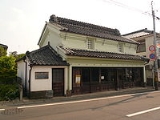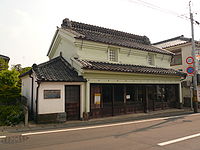
Michiko Nagai
Encyclopedia
; is a writer of historical fiction
in Japan
.
 Born in Tokyo
Born in Tokyo
, Nagai graduated from the Tokyo Womens' University with a degree in Japanese literature
in 1944. She also studied economy history at the University of Tokyo
from 1947-1948. After her marriage to the Nobuo Kuroita, the son of historian Kuroita Katsumi, she went to work for the Shogakukan Publishing Company as an editor, but began to write her own stories with historical settings on the side.
In 1952, she submitted her debut work, Sanjoin ki ("History of Lady Sanjo") to the Sunday Mainichi, where it was awarded second place in the 30th anniversary commemorative edition of that publication. This encouraged her to pursue a career in literature full time, winning the prestigious Naoki Award in 1964, the 21st Women's Culture Award in 1981, the 32nd Kikuchi Award in 1984 and the Yoshikawa Eiji Literary Award in 1987.
She is noted for historical novel
s reassessing the role of women in Japanese history. She is praised for combining historical accuracy with translating her characters emotions into modern terms. In Masako, she countered popular image of Minamoto no Yoritomo
's jealous, power-grasping wife Hojo Masako
(1157–1225) with a more human, sympathetic personality. Her novel was the basis for a year long television drama on the Japanese government television network
NHK
, in 1979.
Likewise, in Gin no yakata ("Silver Mansion", 1980) she rehabilitated the image of Hino Tomiko (1440–1496), wife of the ineffectual Shogun
Ashikaga Yoshimasa
. Historically scorned as an "evil money-grubbing woman" who dragged the country into war, Nagai's portrayal is of a woman who is savior of the government, and who is skilled at finance and politics.
However, her writing was not entirely on the role of women. In 1997, NHK aired a year-long historical drama
in 50 episodes, Mori Motonari
, on the life of the Sengoku period
daimyo
, based on Nagai's book of the same name.
Historical fiction
Historical fiction tells a story that is set in the past. That setting is usually real and drawn from history, and often contains actual historical persons, but the principal characters tend to be fictional...
in Japan
Japan
Japan is an island nation in East Asia. Located in the Pacific Ocean, it lies to the east of the Sea of Japan, China, North Korea, South Korea and Russia, stretching from the Sea of Okhotsk in the north to the East China Sea and Taiwan in the south...
.

Tokyo
, ; officially , is one of the 47 prefectures of Japan. Tokyo is the capital of Japan, the center of the Greater Tokyo Area, and the largest metropolitan area of Japan. It is the seat of the Japanese government and the Imperial Palace, and the home of the Japanese Imperial Family...
, Nagai graduated from the Tokyo Womens' University with a degree in Japanese literature
Japanese literature
Early works of Japanese literature were heavily influenced by cultural contact with China and Chinese literature, often written in Classical Chinese. Indian literature also had an influence through the diffusion of Buddhism in Japan...
in 1944. She also studied economy history at the University of Tokyo
University of Tokyo
, abbreviated as , is a major research university located in Tokyo, Japan. The University has 10 faculties with a total of around 30,000 students, 2,100 of whom are foreign. Its five campuses are in Hongō, Komaba, Kashiwa, Shirokane and Nakano. It is considered to be the most prestigious university...
from 1947-1948. After her marriage to the Nobuo Kuroita, the son of historian Kuroita Katsumi, she went to work for the Shogakukan Publishing Company as an editor, but began to write her own stories with historical settings on the side.
In 1952, she submitted her debut work, Sanjoin ki ("History of Lady Sanjo") to the Sunday Mainichi, where it was awarded second place in the 30th anniversary commemorative edition of that publication. This encouraged her to pursue a career in literature full time, winning the prestigious Naoki Award in 1964, the 21st Women's Culture Award in 1981, the 32nd Kikuchi Award in 1984 and the Yoshikawa Eiji Literary Award in 1987.
She is noted for historical novel
Historical novel
According to Encyclopædia Britannica, a historical novel is-Development:An early example of historical prose fiction is Luó Guànzhōng's 14th century Romance of the Three Kingdoms, which covers one of the most important periods of Chinese history and left a lasting impact on Chinese culture.The...
s reassessing the role of women in Japanese history. She is praised for combining historical accuracy with translating her characters emotions into modern terms. In Masako, she countered popular image of Minamoto no Yoritomo
Minamoto no Yoritomo
was the founder and the first shogun of the Kamakura Shogunate of Japan. He ruled from 1192 until 1199.-Early life and exile :Yoritomo was the third son of Minamoto no Yoshitomo, heir of the Minamoto clan, and his official wife, a daughter of Fujiwara no Suenori, who was a member of the...
's jealous, power-grasping wife Hojo Masako
Hojo Masako
was the eldest child of Hōjō Tokimasa by his wife Hōjō no Maki, the first shikken, or regent, of the Kamakura shogunate. She was the sister of Hōjō Yoshitoki, and was married to Minamoto no Yoritomo, the first shogun of the Kamakura period...
(1157–1225) with a more human, sympathetic personality. Her novel was the basis for a year long television drama on the Japanese government television network
Television network
A television network is a telecommunications network for distribution of television program content, whereby a central operation provides programming to many television stations or pay TV providers. Until the mid-1980s, television programming in most countries of the world was dominated by a small...
NHK
NHK
NHK is Japan's national public broadcasting organization. NHK, which has always identified itself to its audiences by the English pronunciation of its initials, is a publicly owned corporation funded by viewers' payments of a television license fee....
, in 1979.
Likewise, in Gin no yakata ("Silver Mansion", 1980) she rehabilitated the image of Hino Tomiko (1440–1496), wife of the ineffectual Shogun
Shogun
A was one of the hereditary military dictators of Japan from 1192 to 1867. In this period, the shoguns, or their shikken regents , were the de facto rulers of Japan though they were nominally appointed by the emperor...
Ashikaga Yoshimasa
Ashikaga Yoshimasa
was the 8th shogun of the Ashikaga shogunate who reigned from 1449 to 1473 during the Muromachi period of Japan. Yoshimasa was the son of the sixth shogun Ashikaga Yoshinori....
. Historically scorned as an "evil money-grubbing woman" who dragged the country into war, Nagai's portrayal is of a woman who is savior of the government, and who is skilled at finance and politics.
However, her writing was not entirely on the role of women. In 1997, NHK aired a year-long historical drama
Taiga drama
is the name NHK gives to the annual, year-long historical fiction television series it broadcasts in Japan. Beginning in 1963 with the black-and-white Hana no Shōgai, starring kabuki actor Onoe Shōroku and Takarazuka star Awashima Chikage, the network has hired a producer, director, writer, music...
in 50 episodes, Mori Motonari
Mori Motonari
was a prominent daimyō in the west Chūgoku region of Japan during the Sengoku period of the 16th century.-Early years:Mōri Motonari was born under the name Shojumaru in a small domain of Aki province in 1497. He is said to have been born at Suzuo Castle, his mother's homeland...
, on the life of the Sengoku period
Sengoku period
The or Warring States period in Japanese history was a time of social upheaval, political intrigue, and nearly constant military conflict that lasted roughly from the middle of the 15th century to the beginning of the 17th century. The name "Sengoku" was adopted by Japanese historians in reference...
daimyo
Daimyo
is a generic term referring to the powerful territorial lords in pre-modern Japan who ruled most of the country from their vast, hereditary land holdings...
, based on Nagai's book of the same name.

